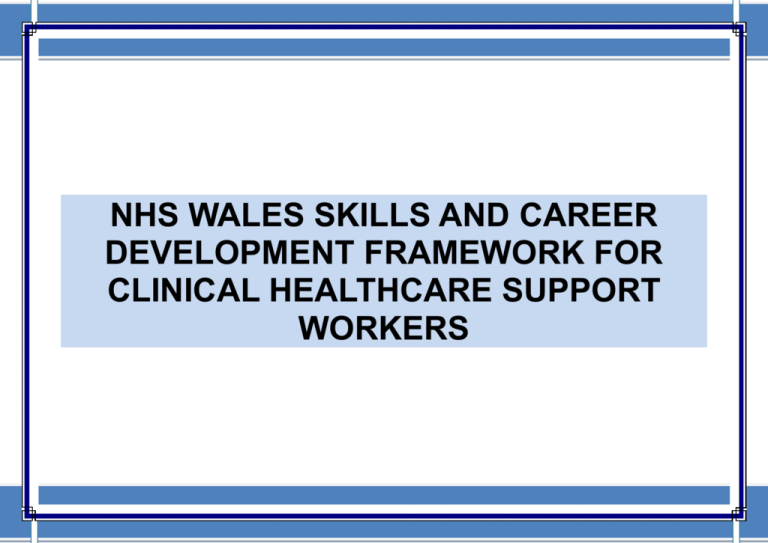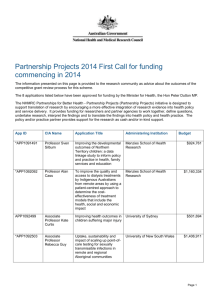Healthcare Support Worker Career Framework
advertisement

NHS WALES SKILLS AND CAREER DEVELOPMENT FRAMEWORK FOR CLINICAL HEALTHCARE SUPPORT WORKERS CONTENTS Page 1. Purpose 3 2. Introduction 3 3. Policy Background 4 4. Background 5 5. Description of this Skills and Career Development Framework 5 6. Career Levels 6 7. Benefits 6 8. Components of the Skills and Career Development Framework 7 8.1 8.2 8.3 7 9 11 9. Role Definition and Scope of the Practice Descriptors Core Competences Education Pathways Conclusion 17 2 NHS WALES SKILLS AND CAREER DEVELOPMENT FRAMEWORK FOR HEALTHCARE SUPPORT WORKERS 1. Purpose The Purpose of this Framework is to provide a governance mechanism to inform the skills and career development of the clinical Healthcare Support Worker (HCSW) workforce in NHS Wales. This resource will apply to those HCSWs in Nursing, Midwifery and Allied Health Professional (AHP) roles. It will support the current and future role development through the provision of standardisation of the scope of their roles and the development of educational pathways with the underpinning knowledge and skills to practice safely. This framework will support HCSW careers and increase the professionalization of this core workforce, building on the high quality service already delivered to individuals by this workforce. 2. Introduction New roles are likely to emerge that use the skill mix of existing staff in different ways and achieving success will require the availability of an effective and engaged workforce. Changes to how and where health and social care services are delivered will mean that employers are increasingly developing their support worker workforce to meet current and future health, financial and workforce challenges. Employees can frequently feel hindered and disengaged from an organisation when career progression opportunities seem limited. The solution is for organisations to put in place realistic development and career-advancement pathways that are actively managed, and offer a clear line of sight to development opportunities for the workforce. The adoption of an all Wales approach to career progression opportunities for the support worker workforce through the development and implementation of this framework will help deliver many benefits to individual support workers, organisations and their service users. Using a career framework will allow for the transferability between employers and make it easier for staff to understand the expectations and standards required of them. The identification of the all Wales education requirements for HCSWs as part of this Framework will provide a standardised programme of development. Where applicable the education will be accredited to give assurance of quality to organisations. For the first time HCSWs will have their standards, competences and 3 training identified at an all Wales level to support the development of those skills and attributes required by NHS Wales to deliver safe and effective care. 3. Policy Background As in other developed countries, the healthcare system in Wales is facing many challenges: growing demand, health inequalities, increasing public expectations, an ageing workforce, staff shortages and demographics, budget pressures and the integration of health and social care. The Minister for Health and Social Care asked the Bevan Commission to consider how Wales makes the most effective use of available resources to ensure the provision of high quality and consistent care across Wales. The Commission stated that “it is evident that the status quo is unsustainable and change is core”. It also recommended the adoption of “prudent healthcare” in order to deliver a cost effective health service. Workforce ‘modernisation’ is one of the strategies for addressing the challenges of delivering prudent healthcare and driving the changes needed. There have been a range of workforce changes over the past decade but further change is needed if new ways of delivering services and care are to be introduced and sustained. Organisations will need to ensure that people with the right skills and competences, in the right numbers, are in the right jobs. Strengthening workforce development through training and development and supporting career progression to ensure the provision of a competent, flexible and sustainable workforce is a key WG priority. Although the flexibility and variety of healthcare support worker roles is a great strength, widespread variation in job descriptions and titles make roles difficult to define. In addition at present, across the UK healthcare support workers are not regulated. The WG has taken the view that primary responsibility for unregulated staff should lie with the employers rather than suggesting regulatory reform and has advocated the need for adequate assurance systems. It is the responsibility therefore of employers to ensure that they have processes in place to deliver safe care. The NHS Wales Strategy for a Flexible and Sustainable Workforce (2008) identified a number of specific recommendations for HCSW including the development of career pathways. In order to provide a more standardised and consistent approach to the development and management of HCSW in Wales the Welsh Government also issued a number of workforce resources to help organisations with their local healthcare support worker workforce modernisation initiatives. These include: The Code of Conduct for Healthcare Support Workers and the Code of Practice for Employers (2011). The codes provide a national definition of HCSW and set out the standards required by HCSW and the employers. The codes provide an assurance framework for public protection. 4 The NHS Wales Delegation Guidance (2011) provides a definition of delegation and clarifies in particular the responsibilities and accountabilities of both registered and non-registered staff involved in the delegation process. Central funding to support the training and development of bands 1-4 made available annually to organisations. These products together with this framework provide organisations with a repository of resources to support the governance arrangements required for the management and safe practice of HCSW. 4. Background HCSWs make up 41% of the NHS Wales workforce and make a valuable contribution to service delivery in both clinical and nonclinical services with over half of this 41% working in clinical settings. Interest in their education, training and development and how HCSWs are trained has grown in recent years as a result of a number of high profile failures in the health sector. For this reason the first component of this Framework focuses on the HCSWs working within clinical settings. Many of tomorrow’s workforce is here today. Much greater priority therefore needs to be given to developing the skills and competences of the current workforce, to better meet the needs of service users today and tomorrow. Without building capacities and capabilities in our workforce there is the risk of being perpetually out of step and continually training and developing a workforce to do yesterday’s, not tomorrow’s, healthcare work. Although the most highly paid section of the workforce currently attracts most of the attention and the training budget, there is an urgent need to develop and invest in our healthcare support staff in hospitals, and care workers in the community in a better and more planned way. 5. Description of this Skills and Career Development Framework A well-designed career framework provides a strategy for guiding and supporting career development. It is a workforce resource that sets the stages for when an employee’s preparation for progression corresponds with the organisations priorities. It is designed to make effective use of employees’ capabilities in conjunction with the changing needs of the organisation. It is not however, a mechanism that guarantees an automatic route to promotion. This HCSW career framework is based on national occupational standards and competences placing the focus on the skills and education rather than the job or the role. As a result this approach enables greater flexibility and transferability of staff. Individuals could move from working in one organisation to another, or alternatively individuals could move from one clinical specialty to another e.g. mental health to dietetic services. 5 As an interactive online workforce resource this Skills and Career development Framework will enable organisations and individuals to identify their current position within the Framework, their development pathway for their current role and also what education would be required for an individual to transfer to another service area. 6. Career Levels The Skills for Healthcareer Framework for health consists of nine different levels at which a function could be performed, from level 1 initial entry level jobs to more senior staff at level 9. It aids workforce flexibility, providing a common currency to map employees’ competence portfolios, and to identify areas of transferability to other job roles. This allows progression in directions which may not have been identified through traditional routes. This Career Framework for HCSWs will focus on levels 2 to 4 of the Skills for Health Framework and not on Agenda for Change Banding. Key Elements of the Career Framework.docx 7. Benefits Developing a career framework will benefit both the organisation and its employees. It should fit with the organisational development culture of the organisation, set realistic expectations for employees, help individuals develop the competences needed and facilitate the promotion of the right people. The benefits of having a career framework are to: Provide robust and consistent guidance for education and training to ensure future resources are targeted and utilised in line with the prudent healthcare agenda and meet future service needs more effectively; Help organisations to understand where the workforce talent is concentrated; how prepared, or ill-prepared, they are to meet future needs and challenges; Demonstrate how HCSW can be developed and retained while simultaneously improving the performance of the organisation; Provide a mechanism through which managers can determine how equipped current talent is to fulfil service needs. At its core, a career framework identifies the competences and skills and subsequently the roles required by the organisation; 6 Provide an additional resource to facilitate the PADR process in supporting career development; Support NHS Wales overarching workforce agenda by having a more satisfied and engaged HCSW workforce; Support staff retention and succession planning, improving staff morale, upholding policy commitments, and providing a career development pathway and potential access route to registered professions. 8. Components of the Skills and Career Development Framework This next section will provide a description of each of the component parts of this Framework. 8.1 Role Definition and Scope of the Practice Descriptors NHS Wales established a definition for HCSW in 2011. The role definition within this framework is based on that definition which is contained within the Code of Conduct for Healthcare Support Workers in Wales. This definition is broad by necessity to cover all HCSW working at levels 2 to 4. In order to provide more specific detail which reflects what is expected, a scope of practice descriptor has been developed for each level, to include the required Qualifications and Credit Framework (QCF) level. These descriptors outline what HCSWs undertake on a day to day basis. It should be noted that those HCSW at Level 3 will have all the attributes, skills and knowledge as those described for Level 2. Level 4 HCSWs will have all the attributes, skills and knowledge described for Level 2 and 3. This will assist organisations and individuals in the identification of career progression routes. Table overleaf provides the role definition and scope of practice for each level for NHS Wales. To ensure consistency with other workforce resources and to avoid any confusion in understanding the meaning, definitions of key terms are provided in the glossary. 7 Healthcare Support Worker Skills and Career Development Framework Role Definition Healthcare support workers provide a direct and indirect service to individuals in a variety of care settings. They will undertake a range of delegated duties under supervision. Level 4 (Assistant Practitioner) Scope of Practice A Level 4 Assistant Practitioner is expected to independently manage their own work and case load, undertaking unsupervised tasks delegated by a registered practitioner. Having an understanding of evidence based practice and delivering care in line with current evidence, they will take responsibility for taking action relative to an individual’s health and care in accordance with organisational policy and procedures. They will be responsible for some elements of assessment, implementing programmes of care and modifying individualised care plans, reporting back to the registered practitioner. They may delegate work to others and may supervise, teach and assess other staff. Education Requirement – 120 credits at Level 4. Level 3 Scope of Practice A Level 3 HCSW will have a greater degree of autonomy and may undertake a broader range of more complex interventions, problem solving and taking action on an individual’s health and care in accordance with organisational policy and procedures. They will work on their own initiative, undertaking delegated and unsupervised tasks from a registered practitioner/assistant practitioner. They should contribute to assessment and assist in the development, implementation and evaluation of individualised care plans. They are able to supervise other staff and will promote the delivery of high quality individual are. Education Requirement – 65 credits at a minimum of Level 3, to include 35 credits of Mandatory QCF Units plus 30 credits (CQFW accredited learning) from optional units aligned to the job role being undertaken. Level 2 Scope of Practice A Level 2 HCSW will at all times work under the delegation of a registered practitioner or assistant practitioner in the delivery of care. They are expected to work as part of a team providing care within defined protocols, under supervision of and reporting to a registered practitioner/assistant practitioner. They will be responsible for following care plans and recording all personally generated observations and documenting care given in an individual’s notes. Education Requirement – 50 credits at a minimum of Level 2, to include 29 credits of Mandatory QCF Units plus 21 credits (CQFW accredited learning) from optional units aligned to the job role being undertaken. 8 8.2 Core Competences Work at an All Wales level to agree the core competences for HCSW at level 2, 3 and 4 has been completed. The identification of the relevant accredited education at the required level for each competency will ensure the attainment of a consistent level of skill for this workforce across Wales. It provides a baseline of competence underpinned by knowledge and quality assures the skills of staff in these core areas. The table below details those core competences that all HCSW in Wales will be required to achieve in the future, providing assurance to organisations with regards to the quality of the services delivered to individuals. Each competency is based on a National Occupational Standard (NOS) which provides the potential opportunity for increased future working across Health and Social care. Each competency is also mapped to the relevant KSF Dimension. National Occupational Standards Competence Title Communicate effectively in a healthcare environment Support effective communication Conduct handover between healthcare personnel Interact with individuals using telecommunications Collate and communicate health information to individuals Contribute to the discharge of an individual into the care of another service Receive Transmit store and Retrieve Information Develop your own knowledge and practice Manage yourself Comply with legal requirements for maintaining confidentiality in healthcare Maintain health, safety and security practices within a health setting Maintain a safe and clean environment Disposal of clinical and non clinical waste within healthcare Minimise the risk of spreading infection by cleaning, disinfecting and maintaining environments Perform hand hygiene to prevent the spread of infection Clean, disinfect and remove spillages of blood and other body fluids to minimise the risk of infection Minimise the risk of spreading infection by cleaning, disinfection and storing care equipment KSF Core Dimensions 1. Communication 2. Personal and People Development 3. Health, Safety and Security 9 Minimise the risk of exposure to blood and body fluids while providing care Use personal protective equipment to prevent the spread of infection Safely dispose of healthcare waste, including sharps, to prevent the spread of infection Support the health and safety of yourself and individuals Protect yourself from the risk of violence at work Resolve and evaluate work-related violent incidents Contribute to moving and positioning individuals Prepare and dress for work in healthcare settings Contribute to the prevention and management of abusive and aggressive behaviour Work with others to improve customer service Contribute to improvement of services Promote continuous improvement Act within the limits of your competence and authority Monitor your own work practices Contribute to the effectiveness of teams Promote the effectiveness of teams Uphold the rights of individuals Foster peoples equality, diversity and rights Support the safeguarding of individuals Communicate with individuals about promoting their health and wellbeing Enable individuals to change their behaviour to improve their own health and wellbeing Support Individuals to manage their own health and social wellbeing Contribute to addressing situations where there is risk of danger, harm or abuse Develop effective relationships with individuals Move and position individuals 4. Service Improvement 5. Quality 6. Equality and Diversity 7. Health & Wellbeing 10 8.3 Education Pathways Roles which provide access to clear development paths through recognised learning in the workplace have the potential to provide attractive opportunities for younger people wishing to enter the workforce, or for more experienced workers seeking a career change. In order to achieve this there needs to be a national consensus on the knowledge and skills required by HCSWs within the different areas of the service and the range of qualifications which support that development. The detailing of Education Pathways for HCSWs at an all Wales level will provide consistency and transferability within and across organisations ensuring that the same high level of skills and competences are provided across the whole of Wales. The lack of agreement and standardisation on the knowledge and skills needed by different groups of support workers at different career levels has led to diverse approaches to the development and delivery of training provision across Wales. This has resulted in limited transferability and mobility of staff between different areas of the service. And, when individuals do undertake qualifications, often neither they nor the employer can see where they fit in terms of wider career development. Each Education Pathway will comprise of four elements: Induction Core Competences Core Skills Wales Clinical Skills Clinical Induction On appointment, every HCSW in Wales will complete a robust Induction programme to include the UK Core Skills Training Framework (required by all staff working in NHS Wales) and a Clinical Induction programme to provide them with a foundation to practice in a safe, compassionate and dignified manner in clinical areas. It will include the following: Behaviour and conduct Dignity, Respect and Compassion Person centred care and awareness of an individual’s needs Communication, active listening and responding Importance of noticing and responding appropriately Recognising the deteriorating patient 11 Raising issues and concerns Organisational values Reflection on induction period This will be achieved within two weeks of commencement of employment before starting clinical practice and will be in addition to any Corporate Induction provided. Historically there has been no standard approach to clinical induction for this group of staff and this resource will rectify that. Core Competences The Core Competences on pages 9/10 identified as part of these Education Pathways will ensure the development of those key competences which will be required by all HCSWs in Wales. These competences will be underpinned by accredited units of learning at the appropriate educational level which could be used to build a complete qualification. Core Skills Wales The inclusion of Communication, Application of Number and Information Communication Technology (ICT) in the pathway will support the effectiveness of the learning and performance within a work based environment for those who require it. Clinical Skills A number of clinical areas have already developed, at an all Wales level, specific education to meet their current and future workforce needs. However, in a number of areas, education has been developed at a more local level in partnership with local education providers. This has resulted in the development of a large number of bespoke units of learning/qualifications which has the potential to have different standards across Wales, cause confusion for service managers and cloud the clarity with regards to progression. Where development pathways have been identified and implemented (Appendix) this Framework will bring them together into one resource to facilitate equality and transferability. For those roles where the development pathway has not been identified work will be done to develop the appropriate level of education at an all Wales/organisational level. The diagrams below show the educational pathways that have already been developed for HCSWs working within Radiology or Adult Acute or Community Nursing. 12 Radiography Support Worker Career Progression Level 4 HCSW (Assistant Practitioner) Higher level of knowledge and skill Education Requirement Certificate of Higher Education in Assistant Radiographic Practice Level 3 HCSW More advanced knowledge of facts, principles and processes of the field of work Education Requirement Level 2 Clinical Imaging Support (Health) Apprenticeship Framework or CQFW Level 2 units Fundamentals of Care Radiation Protection and Awareness Anatomy and Terminology Optional Unit – The Use of Contrast Media in Clinical Imaging Level 2 HCSW Basic factual knowledge of the field of work, effective support to others Education Requirement Level 2 Clinical Imaging Support (Health) Apprenticeship Framework or CQFW Level 2 units Fundamentals of Care Radiation Protection and Awareness Anatomy and Terminology 13 Adult Acute or Community Nursing Support Worker Career Progression Level 4 HCSW (Assistant Practitioner) Higher level of knowledge and skill Education Requirements Certificate in Higher Education or Level 4 Modules – 120 credits Optional – CQFW units mapped to the role e.g. Lymphoedema, Tissue Viability, End of Life Care Level 3 HCSW More advanced knowledge of facts, principles and processes of the field of work Education Requirements Level 3 Diploma in Health and Social Care or Level 3 Diploma in Clinical Healthcare Support Optional – CQFW units mapped to the role e.g. Phlebotomy, Stoma Care Level 2 HCSW Basic factual knowledge of the field of work, effective support to others Education Requirements Level 2 Diploma in Health and Social Care or Level 2 Diploma in Clinical Healthcare Support Optional – CQFW units mapped to the role e.g. Nutrition, Continence Care 14 Any education that is developed could either be whole qualifications or units of learning which could lead to a qualification. The education will be accredited and part of the QCF and CQFW. This will provide the learners and NHS Wales with a guarantee of quality of both the qualification programme and the awarding body that offers accredited qualifications. Level 2 – 4 Education pathways will be identified and or developed for HCSWs working within Nursing, Midwifery and AHP service areas detailed in the table below: Nursing and Midwifery Adult Paediatric Mental Health Learning Disabilities Midwifery AHP Dietetics Occupational Therapy (OT) Physiotherapy Podiatry and Orthotics Speech and Language (SLT) Orthoptics Arts Therapies Radiography Operating Department Practitioners (ODP) Clinical Psychologists Paramedics These education pathways will identify the skills and knowledge to provide the foundation for HCSW practice and be the route to progression should this be a requirement for services by the organisation or a career aspiration by individual HCSWs. This will be demonstrated through a portfolio of evidence and reflective learning measured through the PADR process, with a minimum of 20 hours a year commitment by each HCSW to their own personal development. It will also enable them to progress their career within their chosen area of work or transfer to a different nursing or AHP clinical service area. HCSWs will be supported by their organisations to achieve this standard of preparation by providing appropriate opportunities for learning and development, thereby giving assurance as to the skills of HCSWs and the standardisation of their training and development. The expectation is that the Clinical Induction and Core Competences are completed within the first six months of appointment with the relevant clinical skills being achieved within a year. 15 ALL WALES HCSW EDUCATION REQUIREMENTS Clinical Induction UK Core Skills Training Framework – Equality, Diversity & Human Rights Information Governance Moving & Handling Fire Safety Resuscitation Health, Safety & Welfare Safeguarding Adults Safeguarding Children Infection Prevention Control Violence & Aggression Core Skills Wales (ESW) Core Competences with Underpinning Education All Wales Mandatory Clinical Induction Understanding the roles of the HCSW – Communication Fundamental Care Shadow shift Patient Observation & support (if appropriate) Consolidation Core Competences Levels 2 & 3.docx Communication Developing an individual’s ability to select and apply communication skills in ways that are appropriate to their particular context. Application of Number Developing an individual’s ability to select and apply numerical, graphical and related mathematical skills in ways that are appropriate to a particular context Clinical Skills Information Communicatio n Technology (ICT) Developing an individual’s ability to select and apply ICT skills in ways that are appropriate to their particular context Clinical skills appropriate to the role and underpinned by their relevant accredited education 2 weeks 6 months 1Year 16 9. Conclusion This document details the components of the Framework and provides the foundation for completing the online resource for NHS Wales. Work to identify the complete educational pathways that already exist will be undertaken and where gaps are identified education and training will be developed either at a national, regional or organisational level. This complete resource will enable: Managers and staff, to support both immediate learning needs and longer-term career planning to meet future service standards; Workforce planners, to identify the levels and range of skills already existing in the workforce, and what learning is needed to address skills gaps. Learning providers, to help plan learning provision and achieve economies of scale. NHS Wales to maximise the opportunities to improve prudency through a model of collaborative commissioning for HCSW education The inclusion of all of these components within the Framework will give the assurance that support workers have the knowledge and skills needed to carry out their roles, support both service and career development and continue to build on the high quality of care delivered by HCSWs across Wales. In addition the identification of the relevant education will ensure that future resources are not only targeted to those areas of greatest impact but also that any future educational needs which are identified will need to be mapped to this Framework ensuring that the most appropriate education is developed. At a strategic level this Framework will help to ensure that as the largest employer in Wales the NHS has a clear understanding of what the development needs are of their HCSWs and is committed to working in partnership with the Education Sector to meet those needs. Supporting this part of the workforce in this way will help ensure recruitment and retention of staff and promote the NHS in Wales as the employer of choice. In order to realise the full benefits of this Framework organisations will need to provide HCSWs with equity of opportunity for development and also for support to attain the relevant learning and assessment at the agreed QCF and Credit and Qualifications Framework for Wales (CQFW) level 17






